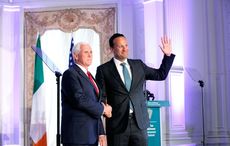Posted by Debbie McGoldrick at 4/1/2009 12:38 PM EDT
Question:
"My fiancé has a J-1 alien physician visa from Romania that requires a two-year home stay that we are working to get waived as his training here was not completed because the hospital where he was a resident closed. We are also trying to find another placement for him at another residency for surgery (his specialization is with liver surgery) so that he can finish his training. This place, I believe, would have to sponsor a J-1 visa for him as well.
"We plan to get married, but I fear if I marry him now he will be at risk of being not allowed back in the U.S. on another J-1 visa because of U.S. immigration's fear that he will not return for the home stay. We really don't know what to do here. Can you advise?"
Answer:
Your situation is complex and would definitely require guidance from an immigration attorney, but we'll give you the basics on J-1 visas (not the particular kind that most Irish students receive for summer work programs) and the two-year home residency requirement you mention.
J exchange visitor visas can be issued for several types of categories - the aforementioned summer work/travel program, short-term scholars, trainees, professors and research scholars and physicians among them. Some of the J categories require that the visa holder leave the U.S. and return to the home country for a minimum of two years after the visa expires (the summer work program does not have this requirement).
It is possible to apply for a waiver of the two-year requirement, but approval is difficult to obtain -- even if the J visa holder marries a U.S. citizen.
There are five possible ways in which to obtain a J waiver - a no objection claim from the applicant's home government; a request from a U.S. government agency on the applicant's behalf; proof that the applicant will face persecution in the country of residence; proof that "exceptional hardship" to a U.S. citizen spouse/children or permanent resident spouse/children will result if the applicant departs the U.S.; or a request from a state public health department, or its equivalent, on the applicant's behalf (only applies to foreign medical graduates who obtained J-1 status for graduate medical training or education).
As we said, the waiver process is quite complicated, but a couple of things to bear in mind - from the information you've provided, it seems as if your fiancé might not be eligible to apply for a waiver based on a no objection claim from his home government. If he was sponsored by the Educational Commission for Foreign Medical Graduates (ECFMG) to do his clinical training then he definitely will not be eligible for the no objection waiver, so make sure and check if this is the case.
You also mention that you plan on marrying, but you worry that his future U.S. J-1 entry will be at risk if you do so. If you marry his need to obtain a future J-1 would be non-existent, as he would eligible to apply for permanent residence based on his marriage to you. However, he would not be eligible to receive permanent resident status until he either completes the two year abroad requirement, or obtains a waiver.
The exceptional hardship waiver mentioned above isn't given solely based on marriage to a U.S. citizen or resident. Hardship to the citizen/resident would have to be proven, which can be done in several ways, including medically, psychologically or economically. If the exceptional hardship waiver was granted, your fiancé could then proceed to his permanent resident application, negating future need for a J-1 visa.
Make sure and consult with a good attorney on your situation. There is also plenty of information on the Web. Start with http://travel.state.gov/pdf/J-1WaiverFAQ.pdf.




Comments